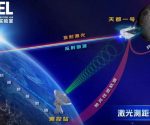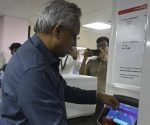Honda conducts surprise reusable rocket test, aims spaceflight by 2029


Honda R&D successfully landed its 6.3-metre-tall experimental reusable launch vehicle after reaching an altitude of 271 metres at its test facility in northern Japan’s Taiki space town.
| Photo Credit: Borui Wang/Unsplash
In a pleasant surprise, Japan’s second-biggest carmaker Honda successfully tested an experimental reusable rocket, the company said, as it seeks to expand into the space sector.
Honda, which hopes to develop the tech prowess for a suborbital launch by 2029, conducted a test flight of its rocket on the northern Japanese island of Hokkaido.
While “no decisions have been made regarding commercialisation of these rocket technologies, Honda will continue making progress in the fundamental research with a technology development goal of realising technological capability to enable a suborbital launch by 2029,” it said in a statement.
“The test was completed successfully, the first time Honda landed a rocket after reaching an altitude of nearly 300 meters,” the statement dated June 17 added.
Honda R&D, the research arm of Japan’s second-biggest carmaker, successfully landed its 6.3-metre-tall experimental reusable launch vehicle after reaching an altitude of 271 metres at its test facility in northern Japan’s space town Taiki, according to the company. The vehicle landed only 37 cm away from its designated landing spot after the minute-long flight.
Demand for satellite launch rockets is expected to increase in the coming years as expectations grow for “a data system in outer space”, the Honda statement said.
“Honda has chosen to take on the technological challenge of developing reusable rockets by utilising Honda technologies amassed in the development of various products and automated driving systems,” it added.
In future, the rockets could be used to set up satellite-based communication tools and to monitor environmental conditions such as global warming, Honda added.
Reusable launch vehicles have been the driver of emerging commercial space missions over the past decade, led by Falcon 9, owned and operated by Elon Musk’s SpaceX. The company’s U.S. rivals, including Blue Origin and companies in China and Europe, also have reusable rocket plans.
The Indian Space Research Organisation is also working on a Reusable Launch Vehicle, although it is still undergoing tests and there is no fixed launch date in sight.
Honda in 2021 had said it was studying space technologies such as reusable rockets, but it had not previously announced the details of a launch test. A suborbital launch may touch the verge of outer space but does not enter orbit.
Studying launch vehicles “has the potential to contribute more to people’s daily lives by launching satellites with its own rockets, that could lead to various services that are also compatible with other Honda business,” the company added.
The Japan Aerospace Exploration Agency (JAXA) is also on a mission to become a major player for satellite launches, including with its H3 rocket, which is not reusable.
Meanwhile Japanese startups are vying to enter the busy field, including Space One, which in December 2024 suffered its second failed rocket launch.
For example, Tokyo-based Innovative Space Carrier last month said it will test-launch a prototype reusable rocket in the United States in December using an American engine.
Published – June 18, 2025 03:44 pm IST















